overall vitality
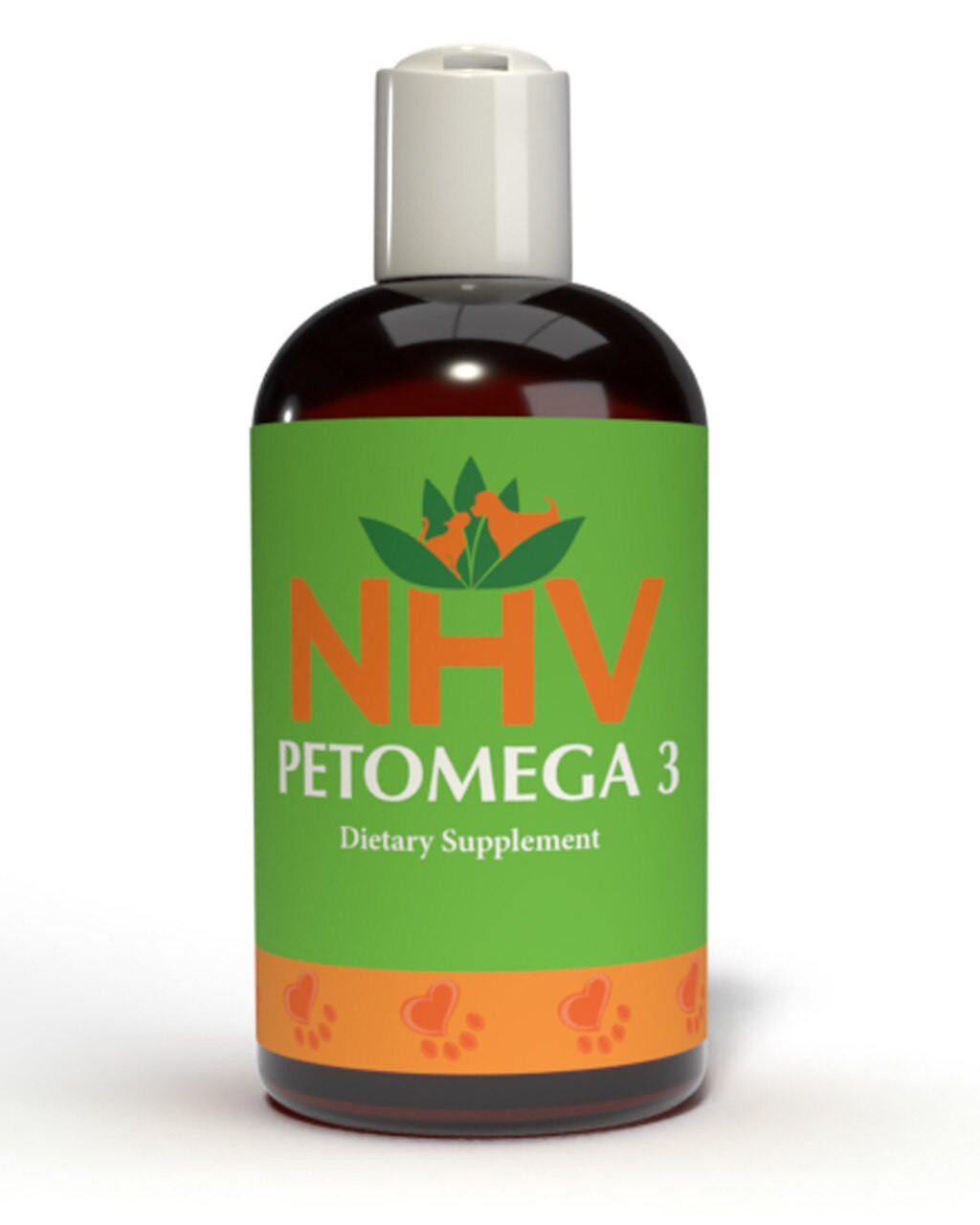
free shipping over $100 (USA & Canada)
1-877-937-4372 the pet expert hotline
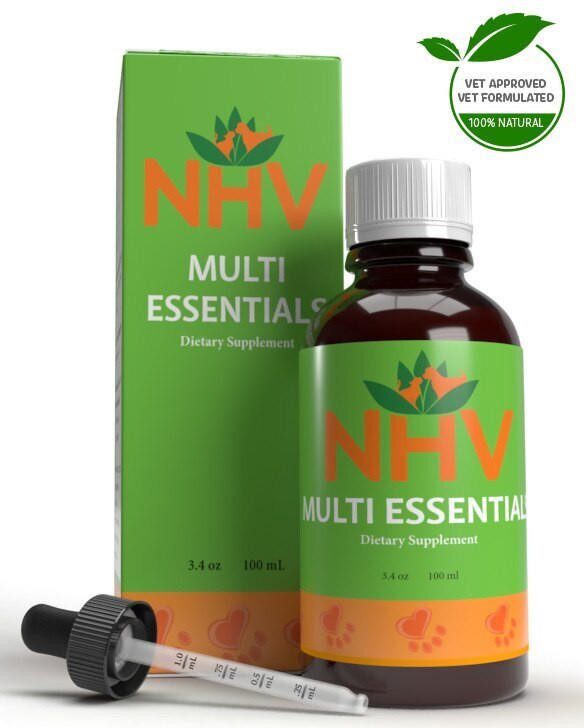
Herbal Digestive Aid, Energy Booster, and Multivitamin for Cats

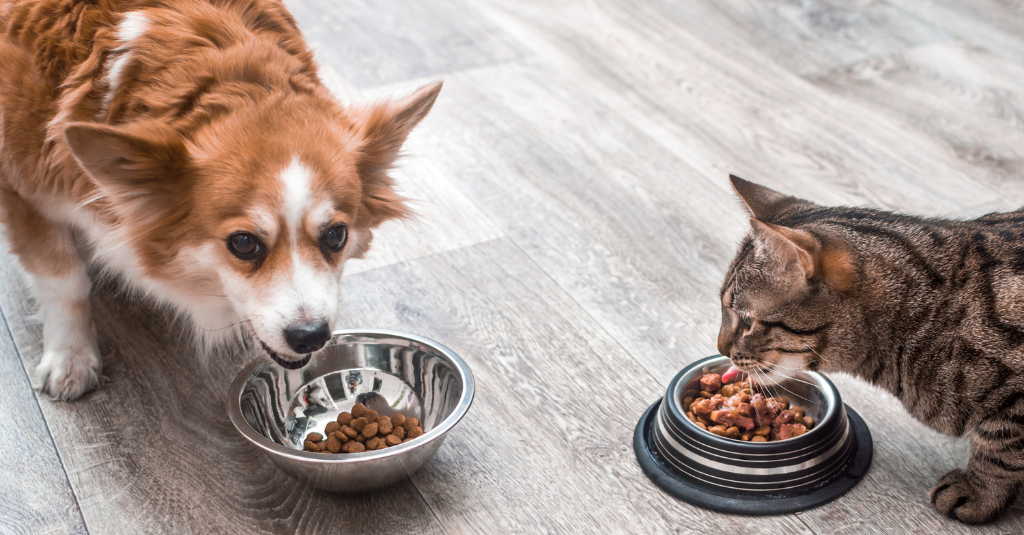
Making sure our beloved pets get all the vitamins and nutrients they need out of their diet is essential in making sure our furkids live healthy and happy lives. Even though we all try our best, there are still some common pet nutrition mistakes that we can make as furparents.
If we let them, our furkiddos can definitely eat way more than they actually need to. So, if their food is constantly available to them, they may gain more calories than necessary and can risk gaining too much weight. To avoid this problem, set up specific times during the day for meals, follow the suggestions on food labels, and ask your trusted veterinarian for advice.
Believe it or not, the idea that cats and dogs love milk isn’t true. Most cats and dogs are actually lactose intolerant. Our furkids can experience diarrhea from drinking milk because the sugars found in it can be hard for them to digest. While it’s true that some cats can digest milk without any issue, milk isn’t a requirement in their diet. So, most veterinarians do not recommend giving milk to cats and dogs.
Some human food can be dangerous for our sweethearts. A human diet can contain toxic ingredients, like garlic and onions, which can cause vomiting, severe tremors, seizures, and even death. If you like the idea of cooking for your little one, we offer a personalized nutritional plan made by our in-house veterinarian, Dr. Amanda.
Most people don’t know this, but giving your dog’s bones can actually result in injuries to their teeth, tongue, or mouth. Bone fragments can become trapped in your pup’s windpipe, making breathing difficult. Bones can also become trapped in the gastrointestinal tract, which will need to be removed either with surgery or endoscopy. Bones can also cause obstructions or perforations, which can result in death. If your pupper likes to chew, ask your veterinarian about some more suitable alternatives.
Bone fragments can become trapped in your pup’s windpipe, making breathing difficult.
Regularly checking your little one’s body weight is important in making sure your loved one isn’t overweight or underweight. You should also avoid diets that are not vet-approved.
We recommend speaking with your trusted veterinarian before anything, as they know your pet best and can offer advice that’s the most suitable for your furkiddo’s needs. You’ll need to make sure that the diet your loved one is on is ideal for your furkid’s age, gender, and species.
If you decide to offer them natural food, choose only foods that are suitable for your pet. For example, cats are obligate carnivores, so they definitely require meat in their diets.
Getting in touch with a veterinary nutritionist is also important as they can help make suggestions on proper diets, which can help to reduce the risk of your little one getting sick due to a lack of nutrients.
Many diseases can be tracked down to an inadequate diet. For example, Taurine, an essential and required nutrient in a kitty’s diet, can cause cardiac issues if not present.
Adding natural dietary supplements to your pet’s diet can be really beneficial! For instance, Petomega 3 and Multi Essentials are good sources of calcium, just like eggshell powder is! However, always talk with a veterinarian before offering calcium to your pet. If offered in big quantities or small quantities, it can affect the health of your little one.
Please feel free to reach out to our team should you have any questions or just want to chat. We’re always here for you!
overall vitality

For Overall Health and Well-Being
buy 2 and save $3
Support your dog’s health with omega 3 fish oil for dogs. Help them maintain a healthy coat, eyes, joints, immune system and overall organ function.


Support your dog’s health with omega 3 fish oil for dogs. Help them maintain a healthy coat, eyes, joints, immune system and overall organ function.

Our omega 3 fish oil for dogs is a great source of EPA (Eicosapentaenoic Acid 600mg) and DHA (Docosahexaenoic acid 460mg) essential fatty acids. This fish oil supplement for dogs is derived from sardines, anchovies and North Atlantic cod liver oil. It is molecularly distilled and cold pressed to improve the bioavailability of the omega 3 fatty acids, and is medical and human grade quality.
Omega 3 fish oil for dogs may be beneficial for the following:
Processed pet foods have increased omega-6 fatty acids, and decreased omega-3 fatty acids. The University of Maryland Medical Center states, "It is very important to maintain a balance between omega-3 and omega-6 fatty acids in the diet. A proper balance helps maintain and even improve health." Your dog’s body cannot easily make essential fatty acids. It is vital to provide omega 3 fish oil for dogs as an added supplement to your pet’s daily diet.
The American Journal of Veterinary Medicine has published studies on the benefits of omega 3 fatty acids (fish oils) for arthritis and degenerative joint disease in dogs. The studies showed that dogs who were given omega 3 fatty acids had a significantly improved ability to get up from a resting position and marked improvement in walking ability.
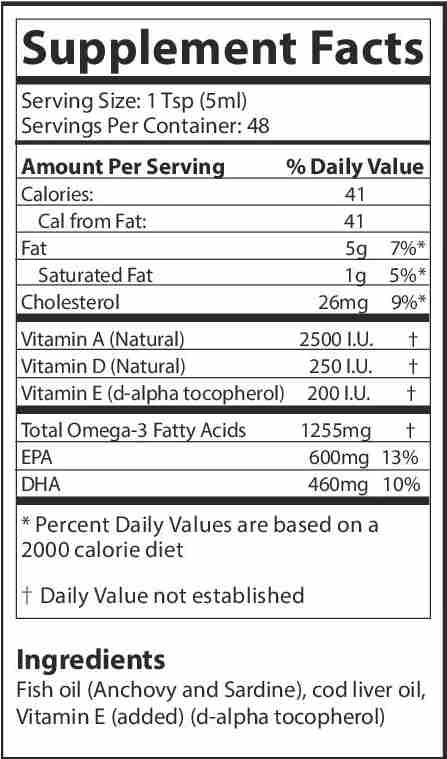
Suggested Dosage: To be taken once per day. Add to food based on weight chart.
Therapeutic Dosage: Double the quantity for maximum period of 4 weeks or follow veterinarian advise.
Pet’s Weight Dosage
0-15 lb = ¼ tsp
15-30 lb = ½ tsp
30-60 lb = 1 tsp
60-90 lb = 1 ½ tsp
How to Administer: Shake well before use. The easiest method is to add the dosage to your pets food. Some pets can be finicky, if this occurs consider hiding the appropriate amount in food most pet’s love such as fish, chicken, yogurt, or a favorite treat. If your pet only eats dry food then soak kibbles at feeding time.
For Best Results
Dietary supplements are beneficial to the health and well-being of your pet and are safe for long-term use. Every pet responds to natural supplements differently, therefore it is important to be consistent and administer the product daily. Supplements generally take two to four weeks to take effect, however this will vary from one animal to the next.
Product Storage
All NHV Natural Pet Products contain no artificial additives, preservatives or coloring. Shelf life after opening is 6 months and must be refrigerated after opening.
Cautions and Contraindications
Avoid During Pregnancy.
Our omega 3 fish oil for dogs is a great source of EPA (Eicosapentaenoic Acid 600mg) and DHA (Docosahexaenoic acid 460mg) essential fatty acids. This fish oil supplement for dogs is derived from sardines, anchovies and North Atlantic cod liver oil. It is molecularly distilled and cold pressed to improve the bioavailability of the omega 3 fatty acids, and is medical and human grade quality.
Omega 3 fish oil for dogs may be beneficial for the following:
Processed pet foods have increased omega-6 fatty acids, and decreased omega-3 fatty acids. The University of Maryland Medical Center states, "It is very important to maintain a balance between omega-3 and omega-6 fatty acids in the diet. A proper balance helps maintain and even improve health." Your dog’s body cannot easily make essential fatty acids. It is vital to provide omega 3 fish oil for dogs as an added supplement to your pet’s daily diet.
The American Journal of Veterinary Medicine has published studies on the benefits of omega 3 fatty acids (fish oils) for arthritis and degenerative joint disease in dogs. The studies showed that dogs who were given omega 3 fatty acids had a significantly improved ability to get up from a resting position and marked improvement in walking ability.

Suggested Dosage: To be taken once per day. Add to food based on weight chart.
Therapeutic Dosage: Double the quantity for maximum period of 4 weeks or follow veterinarian advise.
Pet’s Weight Dosage
0-15 lb = ¼ tsp
15-30 lb = ½ tsp
30-60 lb = 1 tsp
60-90 lb = 1 ½ tsp
How to Administer: Shake well before use. The easiest method is to add the dosage to your pets food. Some pets can be finicky, if this occurs consider hiding the appropriate amount in food most pet’s love such as fish, chicken, yogurt, or a favorite treat. If your pet only eats dry food then soak kibbles at feeding time.
For Best Results
Dietary supplements are beneficial to the health and well-being of your pet and are safe for long-term use. Every pet responds to natural supplements differently, therefore it is important to be consistent and administer the product daily. Supplements generally take two to four weeks to take effect, however this will vary from one animal to the next.
Product Storage
All NHV Natural Pet Products contain no artificial additives, preservatives or coloring. Shelf life after opening is 6 months and must be refrigerated after opening.
Cautions and Contraindications
Avoid During Pregnancy.
Pet Nutrition
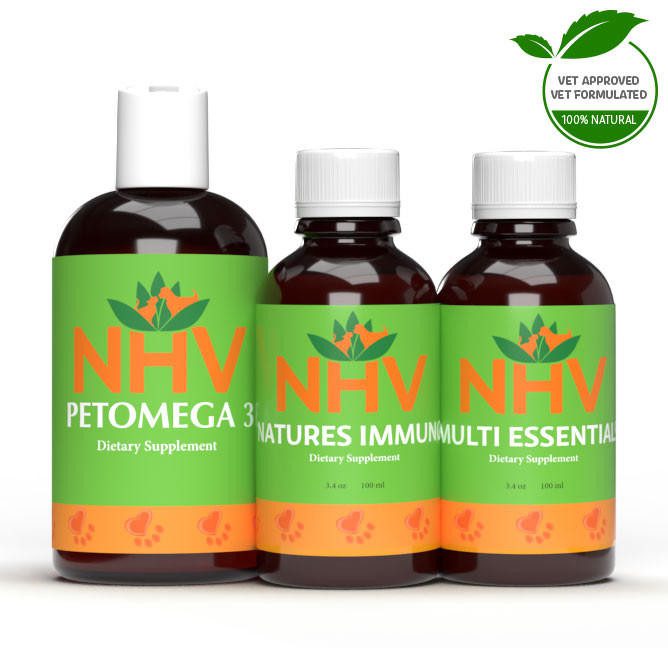
Natural Pet Nutrition Supplements for Cats and Dogs
bundle and save with pet expert kits
3 month supply for a small to medium size pet
As pet parents, we all want our little ones to live a long and healthy life. To help your cat or dog age gracefully, our pet nutrition products are formulated to fill nutritional voids, soothe inflammation and offer a beneficial aid for rebalancing immune health.

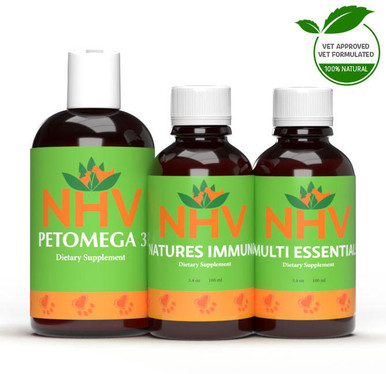
As pet parents, we all want our little ones to live a long and healthy life. To help your cat or dog age gracefully, our pet nutrition products are formulated to fill nutritional voids, soothe inflammation and offer a beneficial aid for rebalancing immune health.

All pet pawrents want their furkiddos to live a long and healthy life. Good health begins with adequate nutrition. So for all those pets out there who want a little nutritional support or may be battling a serious illness, Our Pet Nutrition Supplement Bundle offers comprehensive support for many body processes, including rebalancing immune health and relieving inflammation. All of our supplements are made with full-spectrum plant extracts that are formulated specifically for pets. Full-spectrum means that all of the vitamins, minerals and trace elements are kept intact during the extraction process to make it absorbable for your little one's body.
NHV Multi Essentials is full of vitamins and minerals to help improve digestion and absorption and fill nutritional voids due to poor diet or illness. The omega 3 fatty acids in PetOmega 3 work to relieve inflammation in the GI tract, promote healthy digestion and balance appetite. Natures Immuno's mushroom blend is formulated with anti-inflammatory properties that gently rebalance the immune system (without overstimulating it) and offers cardiovascular, liver, kidney, diabetic, and endocrine health support.
MULTI ESSENTIALS
PETOMEGA 3
NATURES IMMUNO
Help your Pet Live Their Best Life With NHV Supplements
For optimal health, it’s a great idea to supplement your furkiddo’s daily meals with nutrients and immune-boosting ingredients. All of our products are 100% natural and their liquid formulation makes it easy to hide in food. If you need an extra hand (or paw) to improve your pet’s health, get in touch with one of our in-house pet experts. We’re always happy to help!
Made with the finest, organically grown, or ethically harvested herbs. Made specifically for pets, vet-formulated and vet approved.
Multi Essentials
PetOmega 3
Natures Immuno
Select your pet's weight to determine the correct dose.
PETOMEGA 3 : Pet’s Weight Dosage to be taken once a day.
0-15 lb = ¼ tsp
15-30 lb = ½ tsp
30-60 lb = 1 tsp
60-90 lb = 1 ½ tsp
MULTI ESSENTIALS, NATURES IMMUNO : To be taken twice daily. Determine your pet’s weight and then use the easy chart below to determine the correct dose. This is the minimum dosage.
Pet's Weight Dosage
0 - 15 lb = 0.5 ml
16 - 30 lb = 1.0 ml
31 - 45 lb = 1.5 ml
46 - 60 lb = 2.0 ml
61 - 75 lb = 2.5 ml
Over 75 lb = 3.0 ml
How to Administer
Shake well before use. The easiest method is to use the dropper provided and place the drops into your pet’s food or favorite treat. You can also use the dropper and squirt directly into the pet’s mouth. Some pets can be finicky, if this occurs consider hiding the drops in foods most pet’s love such as fish, chicken or yogurt or a favorite treat. If your pet only eats dry food then soak a few kibbles at feeding time.
For Best Results
Herbal dietary supplements are beneficial to the health and well-being of your pet and are safe for long-term use. Every pet responds to natural herbal supplements differently, therefore it is important to be consistent and administer the product daily. Supplements generally take two to four weeks to take effect, however this will vary from one animal to the next.
Product Storage
All NHV Natural Pet Products are pure herbal extracts and contain no artificial additives, preservatives or coloring. Shelf life after opening is 6 months and must be refrigerated after opening.
Cautions and Contraindications
Do not use in pregnant or nursing animals.
All information provided by NHV Natural Pet Products is for educational purposes only.
All information provided by NHV Natural Pet Products is for educational purposes only.
All pet pawrents want their furkiddos to live a long and healthy life. Good health begins with adequate nutrition. So for all those pets out there who want a little nutritional support or may be battling a serious illness, Our Pet Nutrition Supplement Bundle offers comprehensive support for many body processes, including rebalancing immune health and relieving inflammation. All of our supplements are made with full-spectrum plant extracts that are formulated specifically for pets. Full-spectrum means that all of the vitamins, minerals and trace elements are kept intact during the extraction process to make it absorbable for your little one's body.
NHV Multi Essentials is full of vitamins and minerals to help improve digestion and absorption and fill nutritional voids due to poor diet or illness. The omega 3 fatty acids in PetOmega 3 work to relieve inflammation in the GI tract, promote healthy digestion and balance appetite. Natures Immuno's mushroom blend is formulated with anti-inflammatory properties that gently rebalance the immune system (without overstimulating it) and offers cardiovascular, liver, kidney, diabetic, and endocrine health support.
MULTI ESSENTIALS
PETOMEGA 3
NATURES IMMUNO
Help your Pet Live Their Best Life With NHV Supplements
For optimal health, it’s a great idea to supplement your furkiddo’s daily meals with nutrients and immune-boosting ingredients. All of our products are 100% natural and their liquid formulation makes it easy to hide in food. If you need an extra hand (or paw) to improve your pet’s health, get in touch with one of our in-house pet experts. We’re always happy to help!
Made with the finest, organically grown, or ethically harvested herbs. Made specifically for pets, vet-formulated and vet approved.
Multi Essentials
PetOmega 3
Natures Immuno
Select your pet's weight to determine the correct dose.
PETOMEGA 3 : Pet’s Weight Dosage to be taken once a day.
0-15 lb = ¼ tsp
15-30 lb = ½ tsp
30-60 lb = 1 tsp
60-90 lb = 1 ½ tsp
MULTI ESSENTIALS, NATURES IMMUNO : To be taken twice daily. Determine your pet’s weight and then use the easy chart below to determine the correct dose. This is the minimum dosage.
Pet's Weight Dosage
0 - 15 lb = 0.5 ml
16 - 30 lb = 1.0 ml
31 - 45 lb = 1.5 ml
46 - 60 lb = 2.0 ml
61 - 75 lb = 2.5 ml
Over 75 lb = 3.0 ml
How to Administer
Shake well before use. The easiest method is to use the dropper provided and place the drops into your pet’s food or favorite treat. You can also use the dropper and squirt directly into the pet’s mouth. Some pets can be finicky, if this occurs consider hiding the drops in foods most pet’s love such as fish, chicken or yogurt or a favorite treat. If your pet only eats dry food then soak a few kibbles at feeding time.
For Best Results
Herbal dietary supplements are beneficial to the health and well-being of your pet and are safe for long-term use. Every pet responds to natural herbal supplements differently, therefore it is important to be consistent and administer the product daily. Supplements generally take two to four weeks to take effect, however this will vary from one animal to the next.
Product Storage
All NHV Natural Pet Products are pure herbal extracts and contain no artificial additives, preservatives or coloring. Shelf life after opening is 6 months and must be refrigerated after opening.
Cautions and Contraindications
Do not use in pregnant or nursing animals.
All information provided by NHV Natural Pet Products is for educational purposes only.
All information provided by NHV Natural Pet Products is for educational purposes only.
Published: December 1, 2021